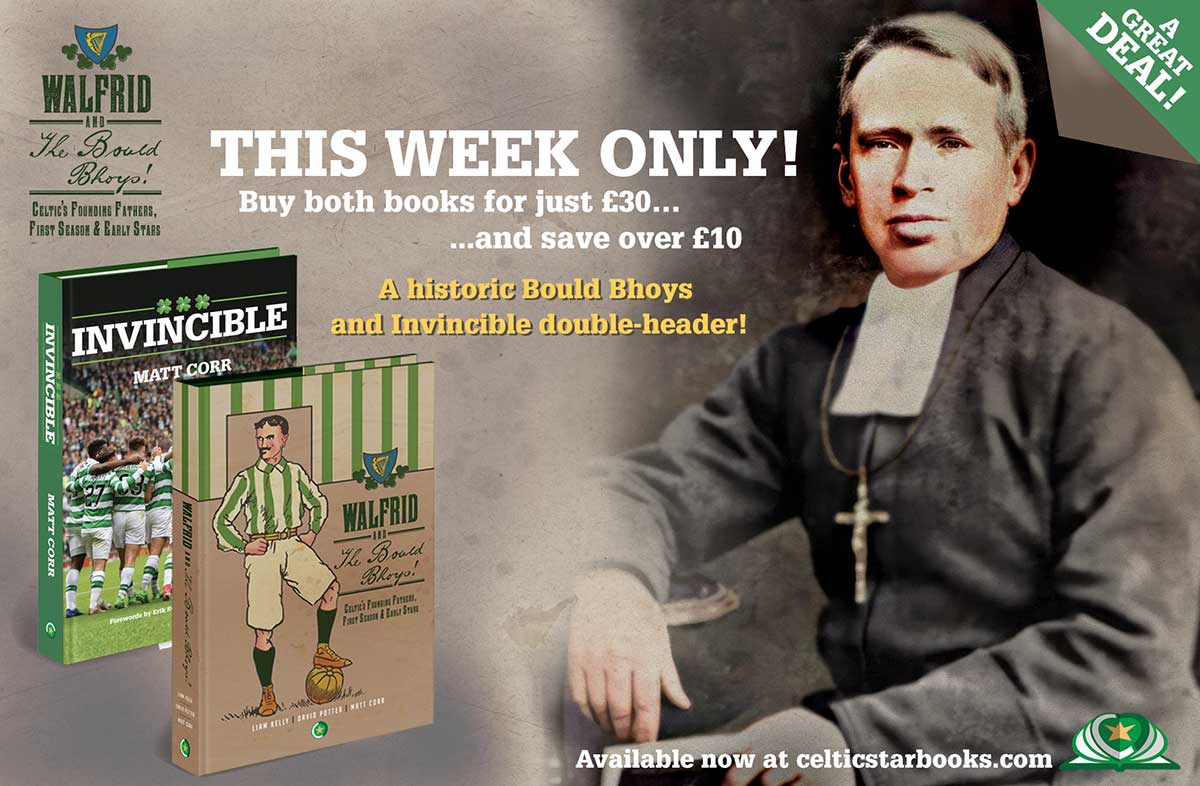Charlie & The Bhoys: Gallagher at 80
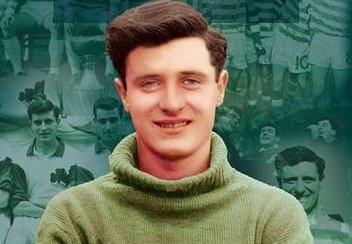
Part 12 – Charlie comes in from the cold to inspire Celts to the title (continued)…
April 1968 began with a visit to Tynecastle to face Hearts, newly-qualified to play in their first Scottish Cup final since defeating Celtic 12 years earlier. With Rangers now just a point ahead following a midweek draw at Tannadice, the Bhoys maintained their winning run and the accompanying pressure on the Govan club by beating Hearts 2-0. Another tricky away fixture had to be negotiated four nights later, Wednesday, 10 April 1968, with a visit to Pittodrie, postponed due to adverse weather conditions as Rangers struggled against Dundee United. A solitary Bobby Lennox goal won the critical two points which took Celts to the summit, the Ibrox club having lost in Leeds on European business 24 hours earlier.
Three days later, Jock Stein fielded the same 11 men for the seventh successive match, that consistency of selection continuing to reap rewards as Celtic beat Dundee 5-2 at Celtic Park, Bobby Lennox and John Hughes both netting doubles. The title then swung in the direction of the Hoops on an evening when Celtic were involved in another competition. An incredible scoring burst of seven goals in 25 minutes – with Bobby Lennox netting an 11-minute hat-trick to push him past the 40-goal mark for the season – destroyed Clyde at Hampden in the Glasgow Cup final, Bobby Murdoch adding an eighth in the second half as the old trophy – the same age as Celtic – remained on the Parkhead sideboard for a fourth successive year.
Meanwhile, further down the Clyde estuary, Rangers were toiling against Morton in their game in hand, 3-1 down before scraping a draw. The dropped – or gained – point meant that both sides were now separated by only goal average at the top of the table, Celtic’s recent goal blitz rendering that a non-contest. Four points from the last two games and the League flag would be joining the League and Glasgow Cups in the east end of Glasgow.

The fixture list would then send that same Morton side to Parkhead three days later, on the penultimate Saturday of the Scottish season. Yet again, Stein sent out the same men to win the two points required to keep the Hoops on track for retaining their title. An early Willie Wallace header appeared to do just that before Joe Mason rifled home an equaliser just before the half-time whistle. The second period was an agonising siege on the Greenock goal which refused to bear the fruit of a winning goal. As the seconds ticked away, news came through from Rugby Park that Rangers had come back from a goal down to beat Kilmarnock 2-1. As things stood, a win for them in their final game of the season – at home to Aberdeen – would take the title to Ibrox for the first time in four years.
With the referee looking at his watch, there would be one final attack, Jimmy Johnstone for the umpteenth time beating his marker to send over a cross. Willie Wallace was first to react, however, his connection was mistimed, the ball momentarily looking like drifting away from the danger zone. Then up stepped the man of the season, Bobby Lennox. He had scored in all 10 previous League games, a Scottish record, notching 17 in all in that period. He would now make that 18 with the most precious of all, stabbing the ball past Crawford in the Morton goal to an outpouring of emotion and joy from the majority of the 48,000 in the stadium.
There would only be time to re-start the game before referee Paterson blew his whistle to another crescendo of noise, as players hugged on the pitch and Stein rushed from the dugout to embrace Lennox, the matchwinner. There would still be some work to be done, in terms of matching Rangers final result, however, one felt that this was a season and era-defining goal.

Seven days later, Dunfermline Athletic faced Hearts in the 1968 Scottish Cup final, the third that decade for the Pars, having faced Celtic in 1961 and 1965 with very different outcomes. The Rangers board of directors had made their second major faux pas of that spring, following up their withdrawal from the Glasgow Cup-tie with Celtic by a refusal to change the timing of their match with Aberdeen at Ibrox, thus avoiding a clash with the match at Hampden just a few miles away, despite a request from both participating clubs with the support of public opinion to do so. Jock Stein, as he so often did, quickly seized the initiative, advising that he would be taking his Celtic squad to the national stadium to watch the game and asking Celtic supporters to do likewise “for the benefit of Scottish football.” The message was not lost.
The Hampden gate would subsequently be impacted, less than half the number who had watched Celtic beat Aberdeen 12 months earlier and no doubt reduced – by whatever extent – by the lack of support from any of the 35,000 or so who made their way to Govan for Rangers final game of the season. The Ibrox club had remained unbeaten in the League all season, a rare feat in any era of football, however, they would contrive to lose a 2-1 lead to the Dons at the last hurdle, an 89th-minute winner for Aberdeen effectively handing the title to Celtic as their players boarded the bus on the way home from the Scottish Cup final. Only a ‘cricket-score’ defeat against Dunfermline, the new Cup-winners, in Fife the following Tuesday could now prevent three-in-a-row. The Karma Police had apparently done their job once again.
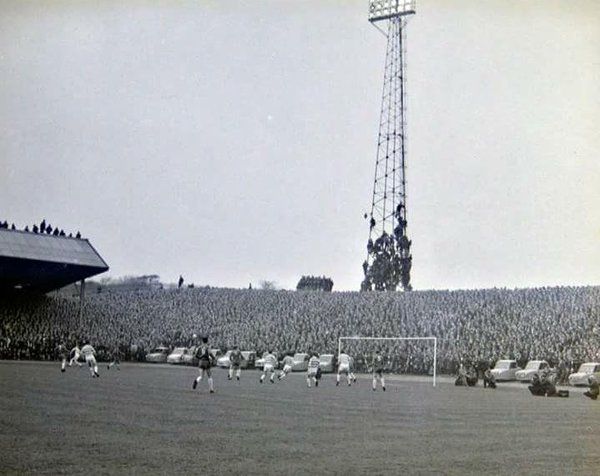
Tuesday, 30 April 1968 witnessed the most incredible movement of Celtic supporters towards Dunfermline, East End Park bulging at the seams with fans perched on the roof and floodlight pylons in search of any vantage point. The official attendance of 27,816 remains a stadium record to this day and, no doubt, ignores many thousands who gained entry without paying.
Jock Stein named the same line-up for the 11th consecutive match as the Bhoys ran out to ensure that even mathematically, they could not be caught in the march to the flag.
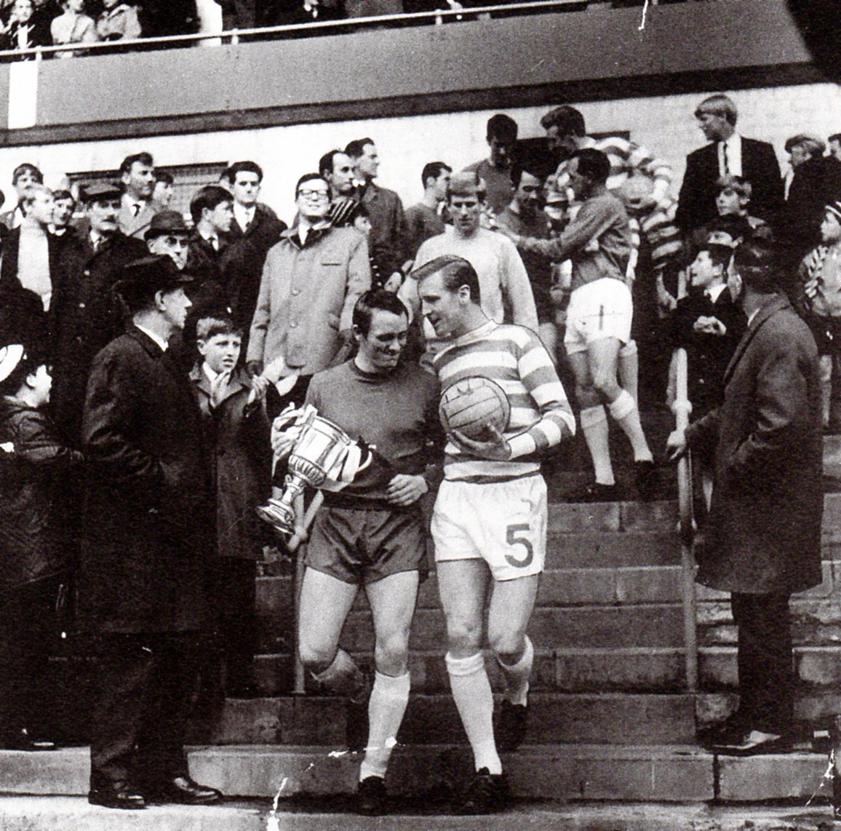
Ronnie Simpson;
Jim Craig & Tommy Gemmell;
Bobby Murdoch, Billy McNeill & Jim Brogan;
Jimmy Johnstone, Charlie Gallagher, Willie Wallace, Bobby Lennox, & John Hughes.
It was perhaps fitting that two key players – one from each club – grabbed the goals on a memorable evening in Fife. Pat Gardner had scored twice on the Saturday, as Dunfermline beat Hearts 3-1 to claim their second Scottish Cup, having scored the second and clinching goal when they knocked out Celtic, the holders, at Parkhead back in January. The Pars striker would give the hosts the lead midway through the first half, only for Bobby Lennox to take a Charlie Gallagher pass and equalise for Celtic just after the break. On a night when play was interrupted twice following the collapse of crush barriers and spectator encroachment, there would be one final act from the legendary Lennox, his shot from an acute angle beating Bent Martin to ensure that the 1966/67 championship would be won by a margin of two points, as Charlie and the Bhoys made it three successive League titles for Glasgow’s own East End.
Postscript
Football can be such a fickle game. Having been a key member of the title-winning team, the match at Dunfermline in April 1968 would surprisingly prove to be the final high of Charlie Gallagher’s career at Celtic Park. There would be a combination of reasons for that, most prominent of those being the emergence of the Quality Street Kids, such as George Connelly, David Hay and Lou Macari, the signing of midfielder Tommy Callaghan from the Fifers in November and a troublesome cartilage injury sustained by Charlie, which required surgery.
There would be just one more appearance in the first team for him. Celtic’s home League Cup quarter-final tie with Hamilton Academical on Wednesday, 11 September 1968 had produced the extremely rare occurrence of two players scoring five times in the same match, Stevie Chalmers and Bobby Lennox the men involved as the Second Division side were beaten 10-0. The following midweek would see Charlie take a place on the bench as the new extended substitution rules in European competition saw 16 players stripped in St Etienne as Celts faced the very real prospect of a second successive first-round elimination after a 2-0 loss in France.
Seven nights later, it was in the less salubrious surroundings of Douglas Park, Hamilton that Charlie took a final bow as a Celtic player. With a double-digit advantage from the first leg, plus the return tie with St Etienne on the horizon, Jock Stein named the following team.
Bobby Wraith;
Jim Craig & John Gorman;
George Connelly, David Hay & John Clark;
Pat McMahon, Joe McBride, Jimmy Quinn, Charlie Gallagher & Lou Macari.Substitute; Kenny Dalglish.
That line-up is the stuff of Celtic ‘quiz buff’ dreams.
Bobby Wraith and John Gorman made their only Celtic appearances that evening, whilst David Hay and Jimmy Quinn received their first starts and Pat McMahon and Charlie Gallagher their last. On the stroke of half-time, with the sides tied at 1-1 on the night, Charlie Gallagher’s free-kick was converted by McMahon to give the Hoops an interval lead. That would be Charlie’s final act as a first-team player at Celtic, Jock Stein introducing the 17-year-old Kenny Dalglish in his place for the second half, a debut for the Bhoy who would be King. Dalglish, with that dry sense of humour we would come to associate him with, would later reflect on how gratifying it was that he enjoyed the confidence of Stein to the extent that the manager had waited until Celts were 12-1 ahead with just 45 minutes to play before introducing him to the senior team!
He need not have worried. Fast-forward to Saturday, 31 July 1971, when Kenny and Charlie found themselves in opposition as Celtic hosted Dumbarton in the first-ever Drybrough Cup tie. Having remained on the periphery at Parkhead for the best part of two years before receiving a free transfer in May 1970, on the eve of Celtic’s second European Cup final, Gallagher had signed for Second Division outfit Dumbarton. The Sons had actually taken Celtic to a replay in the League Cup semi-final a few months later, with Charlie outstanding in both games, before qualifying for the inaugural pre-season tournament for the highest-scoring sides in the country. His return to Celtic Park would be marked by a blast from the past, in the shape of an early free-kick, which gave the visitors the lead and the supporters an excuse to give Gallagher a round of applause.
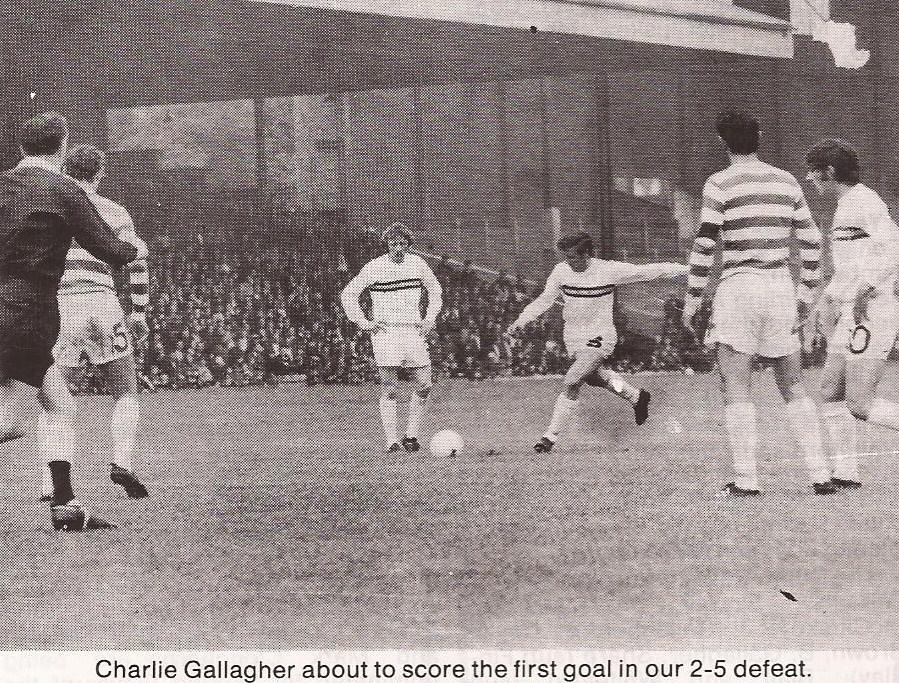
I was privileged to be present that afternoon, to witness the arrival of a new star and pay my respects to a stalwart of the greatest era in Celtic’s history, a man who wore the sacred jersey 185 times, scoring 38 goals in addition to producing two of the most iconic moments of all time for those with Hoops in their veins.
As David Potter’s headline states, “Charlie Gallagher? What a player!”
Thanks for the memories, Charlie of the Bhoys.
Hail Hail,
Matt Corr
Thanks, as always, to the folk behind the Celtic Wiki, a wonderful source of information, and to David Potter, author of Charlie’s biography, Charlie Gallagher? What a Player!
Follow Matt on Twitter @Boola_vogue

